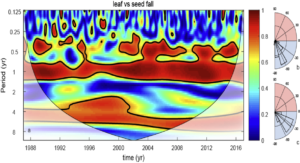Resource acquisition and reproductive strategies of tropical forest in response to the El Niño–Southern Oscillation
The Science
It has been suggested that tree phenology may be regulated by climatic oscillations. Here, we present a 30 year tropical forest dataset that suggests leaf and fruit production is coordinated with ENSO cycles, with greater leaf fall observed prior to El Niño followed by greater seed production.

The Impact
The response of tropical forest to ENSO events and in general to drought and other environmental stress are still under exploration. Here, we show a relatively strong response of tropical phenology (fruiting and leafing) to a warming phase of ENSO. This discovery can help to understand the mechanisms of response or adaptation of plants to climate variability and pave the road to their implementation into Earth Ecosystem Models.
Summary
For the first time an interaction between phenophases of tropical plants (leafing and fruiting) is shown to be driven by large scale periodic climate variations. This interaction mirrors the dynamics between dry and wet season, suggesting adaptive strategies to optimize reproduction and resource acquisition in response to environmental stress.
Contacts (BER PM): Daniel Stover, SC-23.1, Daniel.Stover@science.doe.gov (301-903-0289)
PI Contact: Matteo Detto, Associate Researcher, Dept. of Ecology and Evolutionary Biology Princeton University and Smithsonian Tropical Research Institute, mdetto@princeton.edu
Funding
The Environmental Sciences Program of the Smithsonian Institution funded the data collection. Matteo Detto was partially supported by NGEE-Tropics. Raul Rios, Brian Harvey, and Steven Paton collected the BCI climate data.
Publications
Detto, M., Wright, S. J., Calderón, O. & Muller-Landau, H. C. Resource acquisition and reproductive strategies of tropical forest in response to the El Niño-Southern Oscillation. Nature Communications, 9, 1–8 (2018).
Related Links
https://www.nature.com/articles/s41467-018-03306-9